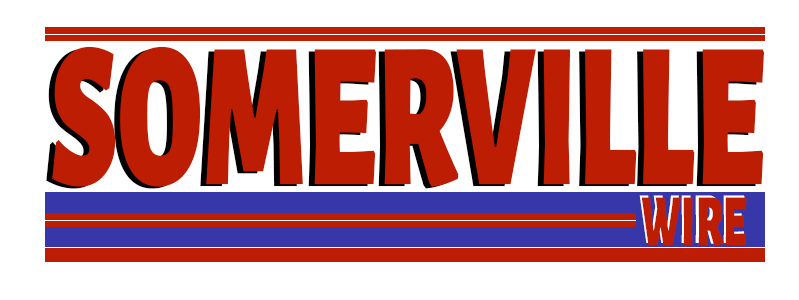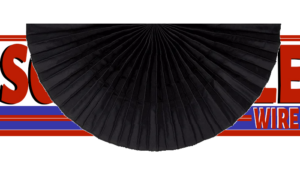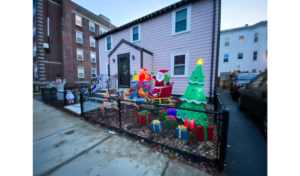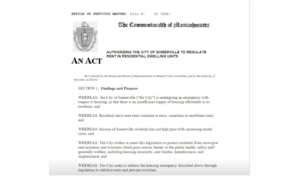“We’ve built a really vibrant community, and it’s very hard to tell whether that still exists.”
The last main stage show that Theatre@First hosted in-person was Anton in Show Business, which closed on March 7, 2020. Following closing night, founding Artistic Director Elizabeth Hunter held a cast party at her home with about 50 or 60 people. “People were kind of talking about COVID and what was going on, but it seemed perfectly reasonable to have 50 or 60 people in my house,” Hunter said. By the next week, everything had shut down.
On March 10, 2020, Massachusetts Governor Charlie Baker declared a state of emergency as coronavirus cases began to climb in the state. With students going into remote learning, masks being a requirement in public spaces, and the start of the Zoom era, daily life changed practically overnight.
With COVID forcing businesses to undergo specific restrictions for their patrons, the virus had a significant impact on arts and entertainment organizations, specifically those that produce live events and in-person gatherings.
Founded in 2003, Theatre@First is an all-volunteer company based in Somerville, and it provides opportunities for people in the community to experience intimate, live theatre in a variety of local venues.
Despite the sudden switch to remote engagement in March 2020, Theatre@First has been keeping busy since then. During the pandemic, they launched Theatre@Home, a program in which members were able to do script readings via Zoom. The theater also ran their Skills Sharpening workshop series every month through Zoom, where they teach skills such as lighting design, theatre publicity, and audition help.
Though they’ve been busy since the start of the pandemic and staying consistent with audience engagement, staying within the bounds of a computer screen has had a big impact on them in terms of moving forward with the rollout of the vaccine earlier this year.
“For all theaters, I think this has been a year of incredible challenge—a year and a half now,” Hunter said. “It looks like it will be a full two years before we put on a full show.”
Aside from putting signs on the sidewalks and posting announcements on Facebook, the primary way for Theatre@First to recruit newcomers is through word of mouth. Coming to auditions is a common way of entry for people, and the company also encourages involvement in their shows, if auditionees are not casted such as being stage managers. Hunter felt that there’s been less of that during the pandemic.
“We’ve still been pulling in new playwrights in particular, and judging from the applications we’ve gotten, we’ve gotten some new directors who are coming to us, which is great,” she detailed. “I think it’s just a much slower process when we’re all online.”
Hunter also added that theatre builds community—that goes for both participants in the company’s programs, as well as audience members.
“We’ve been doing this for 18 years, and we’ve built a really vibrant community, and it’s very hard to tell whether that still exists,” Hunter said. “If we open our doors, and say ‘we’re back,’ are people still paying attention? Are people still interested in what we’re doing?”
Intimacy is a key word in discussing the state of arts and entertainment businesses in the city of Somerville, and something that can be different from its original meaning when talking about its presence in the era of COVID.
Rick Jenkins, owner of The Comedy Studio located in Bow Market, expanded upon the idea of intimacy being a different experience for performers.
“While it’s not that intimacy of [being] in a room together connecting, you are face-to-face and very close with each other, and it seems to me that the people who have gotten really good at doing Zoom learned how to be intimate in that way,” Rick said.
The last show that The Comedy Studio did before the shutdown was on March 13, 2020, and they thought they would only be closed for a few weeks.
“Then it stretched on, so we were not able to do live entertainment, especially because we’re stand up comedy,” Rick explained. “So we couldn’t even distance instruments or have the facilities to do outdoor [performances].”
One thing that The Comedy Studio started doing as a result of the absence of in-person events were classes. The company looked around to see what they could do with COVID, especially because its main focus is stand up comedy. Because The Comedy Studio frequently rented its spaces for events, it didn’t have many facilities to do classes.
“We started teaching our classes online, and that turned out to be very successful because we hadn’t taught classes before, and COVID pushed us into that,” Rick explained.
The Comedy Studio has a flexible format of putting on acts for their shows; they do a showcase format for their shows, meaning that there would be a number of comedians for one show instead of only one act for an entire show.
Rick said that there is a good core of local comedians that The Comedy Studio frequently has, and building relationships with folks at The Comedy Studio is very important in terms of lifting up the work of local creatives.
“It’s really a community, and it’s about building and maintaining that community of people feeling they belong at the club, especially with standup,” Rick said.
Supporting local artists is a big component of building community within arts and entertainment organizations in the city of Somerville. With the onset of the pandemic, supporting local creatives is a bit harder with COVID protocols and guidelines.
The Somerville Arts Council is the local cultural council that celebrates the city’s arts, entertainment, and culture.
One of the biggest services of SAC is to provide financial support for local arts businesses in the city. During the pandemic, SAC received $1 million to give back to the community, so they sent out money to organizations to help them deal with payroll and staffing issues.
“A lot of it is a comfort level too,” said Gregory Jenkins, the Executive Director of SAC. “There are still people that don’t want to go indoors. Part of it is recognizing where people are and respecting that, and just trying to support them and kind of nudge them too, to start planning and thinking about what they’d like to do—that’s kind of where we are.”
Virtual programming was a big thing that SAC did over the course of the pandemic, and it was a way for local artists to get money, even if in-person exhibitions and events were not happening. Titled the “Home Alone Art Series,” local artists would get paid to do virtual performances or presentations, and SAC hosted over 30 virtual shows over the span of several months in the past year.
“I think in my mind, nudging people to feel comfortable saying that it’s safe to perform outdoors, creating distancing guidelines … I feel like we did our best to get people to feel comfortable to see each other again,” Gregory said.
Though he noted that people may have suffered burnout from Zoom, Gregory added that something different that SAC did after the onset of the pandemic was more planning and meeting with community members to discuss how to move forward.
“We used the Zoom lifestyle to say ‘We can meet more, we can have more discussions,’” Gregory explained. “It is easier to get together through Zoom on a planning standpoint. If anything, we’ve taken advantage of that during COVID to plan more as we’re emerging from all of this, and we’re still doing that.”
Though arts and entertainment businesses have been busy since the shutdown back in March 2020, returning to fully in-person events will not probably be for a while for these organizations, even with the vaccination requirement for all City of Somerville employees.
“I will say I feel like we’re not there yet,” Hunter said. “I worry because I think this is true for almost all theaters: there’s a sense of community and people have personal investment in it, both the participants and the audience.”
With the rollout of the vaccine, the city had expanded its reopening guidelines to include the allowance of outdoor performances back in April of 2021. Now with the Omicron surge, things are looking uncertain. Rick Jenkins hopes that one day community members will walk through their doors as they did before.
“We have, I’d say, about 20% of the comedians that still do not feel that they want to go out and perform,” Jenkins said. “I know we have a lot of regular audience members who are still waiting for things to be a little bit safer and clearer. There’s still a process of getting back, but it’s definitely a lot closer, day by day.”
This article was produced in partnership with Professor Gino Canella’s grassroots journalism class at Emerson College. It is syndicated by the MassWire news service of the Boston Institute for Nonprofit Journalism. If you want to see more reporting like this, make a contribution at givetobinj.org.





